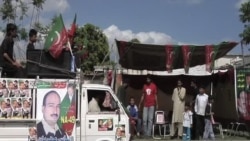ISLAMABAD —
Pakistan is a deeply conservative and traditional society, and religious political parties easily rally thousands in support of their causes. But so far these groups have not been able to translate their street following into solid political power.
Jamaat-e-Islami is one of several conservative religious parties in Pakistan. The May 11 ballot will be the first time it vies for votes on its own.
Party official Khurshid Ahmad said Jamaat-e-Islami appeals to Muslims who want clear, ethical governance and to get away from the U.S.-led war against terrorism.
"Islam deals with the worldly issues as much as it deals with the spiritual issues. So there is no dichotomy between private morality and public morality and the Islamic vision is that one should accept God in totality," he said.
In a country rife with corruption and a faltering economy, the message has appeal.
Islamic law student Mudassar Abbasi said he supports anyone who would implement the Islamic tenets in Pakistan's constitution -- but he does not think religious parties will fare well in the vote.
"If the religious party [were to come] in power in coming election, the result will be that Pakistan will be more stable and less corruption," Abbasi noted. "And the basic rights to every citizen will take easily."
Religious parties are hoping to improve on the eight seats they held in the last 342- seat national assembly.
But Moeed Yusuf, South Asia Advisor with the United States Institute of Peace said the prospect of enacting Sharia law -- conservative Islamic law as laid out in the Quran -- lacks broad appeal.
"Political Islam or politicization of religion, has an emotive appeal in Pakistan, it doesn't have a political appeal, this is a very interesting distinction. You can bring the people on the street - if you are the religious party you can have a million people marching on the street," he stated. "When it comes to going to people and saying vote for me because I am the best governor, you won't find many takers for it."
Many shopkeepers in this small village on the outskirts of Islamabad are voting for the former ruling Pakistan People's Party. Others here are supporting the new opposition party, Pakistan Tehreek-e-Insaf, or PTI.
Shahid Riaz is a PTI supporter who said religious parties are too narrow in their approach.
"I think with my mind, they cannot change the economy, and they think only about the religious matters, I think, and we want democracy and better economy in Pakistan," added Riaz.
Yet politician Imran Khan appears to have found a religious angle to his platform with broad support.
His PTI party is running strong second in the polls. The pillars of Khan's campaign: an Islamic welfare state that is no longer part of the war on terror.
Jamaat-e-Islami is one of several conservative religious parties in Pakistan. The May 11 ballot will be the first time it vies for votes on its own.
Party official Khurshid Ahmad said Jamaat-e-Islami appeals to Muslims who want clear, ethical governance and to get away from the U.S.-led war against terrorism.
"Islam deals with the worldly issues as much as it deals with the spiritual issues. So there is no dichotomy between private morality and public morality and the Islamic vision is that one should accept God in totality," he said.
In a country rife with corruption and a faltering economy, the message has appeal.
Islamic law student Mudassar Abbasi said he supports anyone who would implement the Islamic tenets in Pakistan's constitution -- but he does not think religious parties will fare well in the vote.
"If the religious party [were to come] in power in coming election, the result will be that Pakistan will be more stable and less corruption," Abbasi noted. "And the basic rights to every citizen will take easily."
Religious parties are hoping to improve on the eight seats they held in the last 342- seat national assembly.
But Moeed Yusuf, South Asia Advisor with the United States Institute of Peace said the prospect of enacting Sharia law -- conservative Islamic law as laid out in the Quran -- lacks broad appeal.
"Political Islam or politicization of religion, has an emotive appeal in Pakistan, it doesn't have a political appeal, this is a very interesting distinction. You can bring the people on the street - if you are the religious party you can have a million people marching on the street," he stated. "When it comes to going to people and saying vote for me because I am the best governor, you won't find many takers for it."
Many shopkeepers in this small village on the outskirts of Islamabad are voting for the former ruling Pakistan People's Party. Others here are supporting the new opposition party, Pakistan Tehreek-e-Insaf, or PTI.
Shahid Riaz is a PTI supporter who said religious parties are too narrow in their approach.
"I think with my mind, they cannot change the economy, and they think only about the religious matters, I think, and we want democracy and better economy in Pakistan," added Riaz.
Yet politician Imran Khan appears to have found a religious angle to his platform with broad support.
His PTI party is running strong second in the polls. The pillars of Khan's campaign: an Islamic welfare state that is no longer part of the war on terror.










